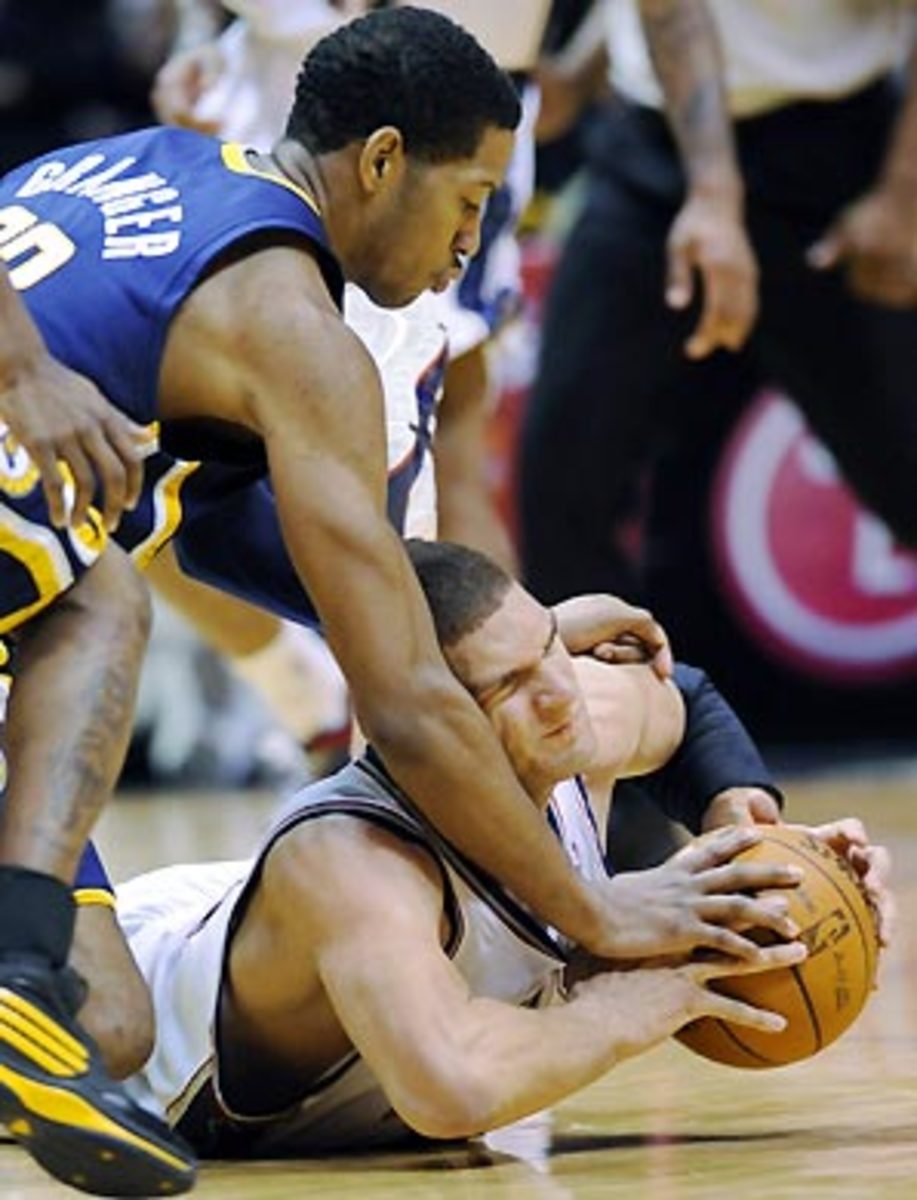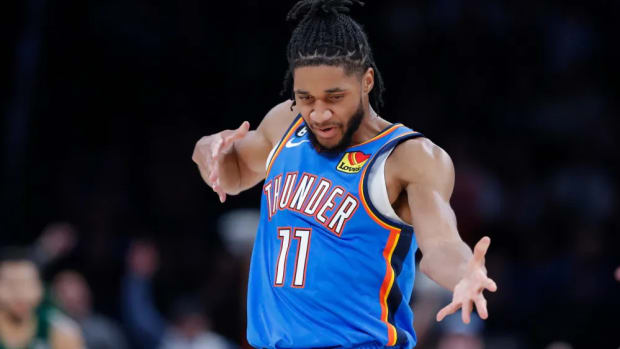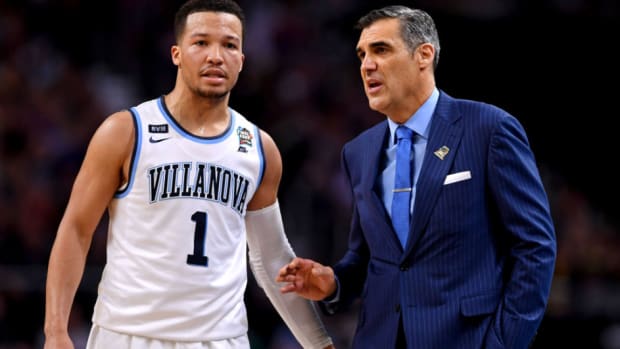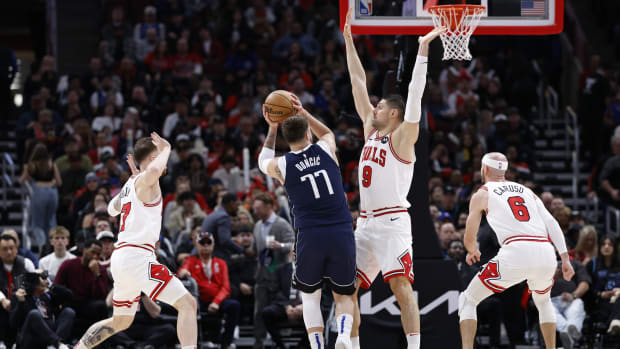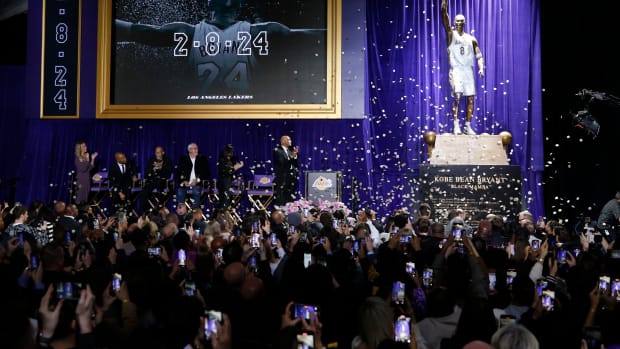Roundtable: Just how bad are Nets, Knicks, Grizzlies and T-Wolves?
1. The Nets, Knicks, Timberwolves and Grizzlies have combined to win four games in three weeks. Do any of these clubs have a chance to match or best, so to speak, the 9-73 record of the 1972-73 Sixers?
Ian Thomsen: No (and don't laugh when I say this), each of those teams is too talented -- in the coaching staff and/or the roster -- to finish that badly.
Jack McCallum: I always take the "no" on these kind of questions, whether they're about all-time winning or all-time losing. When the Sixers achieved 9-73 immortal ignominy, there were only 17 teams in the league. The next-worst team, the Portland Trail Blazers, won 21 games that year and weren't that bad. These days, in a 30-team league, there are simply too many bad teams from which to cobble together a dozen wins.
Chris Mannix: Minnesota has a shot. The Wolves have a rookie coach (Kurt Rambis), a rookie point guard (Jonny Flynn) and an offense no one understands. Factor in an early injury to Kevin Love and Al Jefferson's slow return from a knee injury, and we're talking about a seriously inept club. New Jersey is going to win some games when it gets healthy, the Knicks' offense will probably help them to a couple of three-game winning streaks, and now that Memphis is past the Iverson controversy, it should be OK. But Minnesota is really going to struggle.
Arash Markazi: I don't think any team will win fewer than 10 games this season, so the '72-73 Sixers record is safe. If there is a team that will give them a run for their money, though, it's the Timberwolves. They are just plain lost in Rambis' triangle offense. After beating winless New Jersey by two in the season opener, the Timberwolves have lost 10 straight, including a 41-point blowout to a Warriors team that is in disarray (see above). It's one thing to be in a rebuilding year, but it's another when your players use that as an excuse, as Jefferson did when I spoke to him this season. "No one expects for us to get it quickly," he said about learning the offense. "It might take the whole year for us to get the triangle down the way he wants it."
2. Chris Paul made no secret of his unhappiness with the manner in which coach Byron Scott was fired last week. Did the Hornets make the right decision and will Paul's unhappiness affect his future in New Orleans?
Thomsen: As angered as he was about Scott's dismissal, Paul will really be frustrated by a continuing decline in the team's performance overall. But his feelings are a secondary issue for that franchise. The Hornets can't afford a bad year mainly because their financial success in New Orleans depends on winning enough games to keep the ticket buyers coming back again and again. The decision to fire Scott so early in the season had a last-stand feeling to it. All-Star forward David West backed the firing in hopes that new coach Jeff Bower (who also maintains his oversight role as general manager) can make the offense less predictable. But now that Paul is sidelined by a badly sprained ankle, there may be nothing any coach can do to right the Hornets in the short term.
McCallum: On more than one occasion over the last few seasons I came upon Paul and Scott working out together at the Hornets' practice facility, before any other player or coach had arrived. They were kindred spirits, each viewing the other as essential for professional survival, so it was not at all surprising that Paul reacted as he did. This is the oldest situation in the sports book -- coach succeeds, expectations rise, team doesn't, coach gets fired. Sometimes a change works, sometimes it doesn't, and I'm not nearly smart enough to know what will happen here. But Paul will remain an unhappy camper unless a better supporting cast arrives.
Mannix: When you strip your team of its defensive linchpin (Tyson Chandler) and don't get much from a lottery pick expected to fill a major role (third-year swingman Julian Wright), you're going to struggle. Period. Scott was just the fall guy. Never mind that he extracted water from a stone last year when he led an injury-ravaged team to 49 wins. Never mind that he has played a key role in making Paul the MVP candidate he is. Never mind that he is one season removed from being the NBA's Coach of the Year. The Hornets had it out for him from the first day of training camp. Now they have to deal with Paul, who is under their control through the 2011-12 season but can make some noise if he feels the team isn't headed in the right direction. And by the looks of it, the Hornets not.
Markazi: I don't think the Hornets made the right decision. If Scott was hanging on by such a thin thread, he should have been fired after the Hornets lost by 58 points at home to Denver in the first round of the playoffs last season. What could they have learned about him in nine games this season that they didn't already know? Further, I don't see how Bower and new top assistant Tim Floyd are an improvement over Scott. But as wrong as the decision may be, more troubling for the Hornets is the manner in which it was handled, without consulting the players, especially Paul. Sure, Scott appeared as if he had lost the team, but for management to fire Scott without talking to Paul was a mistake that may come back to haunt it when the franchise point guard becomes a free agent.
3. LeBron James says he will change his number from 23 to 6 next season to honor Michael Jordan. Should the rest of the NBA follow his lead?
Thomsen: The more I think about this, the more I believe other players will be cynical about James' motive. Is he asking other players to honor Jordan -- or to focus on James' own circumstances as a free agent who may be changing teams next season?
McCallum: While I respect LeBron's gesture -- and assume it was done to legitimately honor the man rather than to unleash a whole new line of No. 6 gear -- I don't think anyone is obligated to follow his lead. A number is a very personal thing. The Bulls have retired it and that's enough. Heck, one could argue that No. 6 should be permanently retired -- that's what Bill Russell wore during the years when he changed the game with defense, shot-blocking, outlet passing and big-man fast-breaking.
Mannix: LeBron's like a human starter pistol, isn't he? It's a nice gesture by the game's best player, but it's not something the league is going to mandate. If we retire Jordan's number, shouldn't we retire Bird's and Magic's? And if we retire Bird's and Magic's, what about Russell's? Or Wilt Chamberlain's? Or Oscar Robertson's? There are simply too many landscape-altering talents in NBA history, and unless you are going to retire them all -- in which case, be prepared to buy jerseys with triple digits -- it doesn't make sense to retire one.
Markazi: This is the worst idea anyone in the NBA has had since the league tried implementing those synthetic game balls. Does James think that the NBA started in 1984, when Jordan was drafted, or in 1991, when Jordan won his first championship? Jordan is arguably the greatest player in NBA history, but his impact isn't on par with Jackie Robinson's in baseball and he doesn't deserve the same treatment. The worst part of James' suggestion is that he says he's going to switch to No. 6; two of the men who wore that number, Russell and Dr. J, deserve to be honored for their impact before Jordan does.
4. Coach Don Nelson got into an argument with guard Monta Ellis after a recent Warriors practice. Do these kind of public confrontations ever end well or is this a big step toward some big changes with the Warriors?
Thomsen: Warriors president Robert Rowell has been pushing for the franchise to take a harder line with the players, dating back to the decision to suspend Ellis for 30 games after his mo-ped accident last year (an incident at the heart of Chris Mullin's dismissal as GM, as Mullin was pushing for leniency). So now whenever Nellie criticizes his own players in public, he appears to be doing what Rowell and owner Chris Cohan want him to do. The Warriors have had a talented but volatile roster throughout Cohan's ownership. He has spent big money, but time after time those efforts have blown up in his face, and he and Rowell bear much responsibility for those endless backfires. I dare anyone to predict what comes next. Who would have guessed Nellie would usurp Mullin after the latter brought the former out of retirement three years ago?
McCallum: Whether the confrontations end well, the point in this case is that, with Nellie, they never end. Is there any doubt any more that Nellie is done with the Warriors? They have to make a change. I'm not suggesting this is all Nellie's fault -- some of his criticisms have been warranted -- but this team isn't going anywhere in this poisonous atmosphere.
Mannix: Larry Brown used to butt heads with Allen Iverson, and they had a successful relationship in Philly, but they are more the exception than the rule. Disagreements happen all the time in the NBA, usually behind closed doors. But the Nellie/Warriors situation is different. He seems to have lost the respect of most of his roster. The Stephen Jackson trade should alleviate some of the pressure, but I don't think it solves the bigger problem -- that Nellie is no longer the right man for the job. With a brutal stretch of games against Boston, Cleveland, the Lakers, Portland and San Antonio looming, it will probably get worse in the Bay Area before it gets better.
Markazi: Big changes have already started with the Jackson trade and may continue with Ellis possibly working on his own exit strategy. Nelson is simply the wrong coach for one of the youngest teams in the league. There's no excuse for his odd rotations and the mind games he's been playing with second-year forward Anthony Randolph, who should be in the midst of a breakout season instead of sitting on the bench. Maybe the biggest change will come when Nelson finally steps down after claiming the all-time wins record. (He trails Lenny Wilkens by 21 victories.) That seems to be the only motivation he has for coaching this team these days.






























